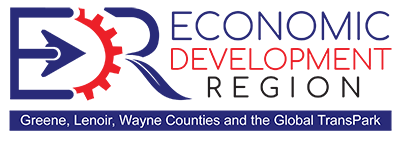Community Close Up: Greene, Lenoir, Wayne Counties and the Global Transpark Are Showing Uncommon Cooperation in Building a 21st Century Powerhouse
Rural communities unite around new and legacy industries.
Throughout most of his career, Richard McGaughy drove from his home in Snow Hill to jobs in Kinston. The 25-minute commute each way added time and expense to his workday. Today, however, it takes the lifelong Snow Hill native just five minutes to get to his new job as a mechanical assembler at Precision Graphics, Inc. The New Jersey-based contract manufacturer that arrived in the tiny Greene County town in late 2021.
“I love it,” says McGaughy of his current position. “You have no idea how much stress came with having to commute.”
Precision Graphics, a family firm founded more than 50 years ago, provides advanced electronics systems to buyers in the U.S., Asia and Europe. When the company outgrew existing space at its longtime location in Somerville, New Jersey, the owners considered an expansion there. But sky-high cost estimates were discouraging. They began exploring potential locations in South Carolina and Texas when a vacant 55,000-square-foot industrial building in Greene County drew their attention.
Tim Dubuque, the company’s chief financial officer, says the building matched the company’s search criteria. “It’s close to I-95 and I-40, which gives us good access both north and south, as well as west,” he says. An analysis of the region’s labor market showed available workers in the area had the skills the company needed. “The labor force was a good fit,” says Dubuque. The warm welcome company representatives received from state and local leaders convinced them Snow Hill was the ideal choice for their $5.1 million facility.
The move brings 70 new jobs over the span of five years. McGaughy is one of 11 local hires the company had made by October, says Dubuque, who personally relocated from New Jersey to ramp up Precision’s Greene County operations.
Precision Graphics is one of several companies to relocate or expand in Greene County during the last two years, providing employment opportunities for local residents weary of the daily commute to Greenville, Wilson and other eastern North Carolina cities. Two years ago, the sparsely populated county joined forces with neighboring Lenoir and Wayne counties to form the North Carolina Global TransPark Economic Development Region in order to pool resources, create scale and pursue common opportunities.
“Instead of a handful of communities operating in relative isolation, we’re now talking about a micro-region with a total population of more than 200,000 and over 120 manufacturers,” explains Mark Pope, executive vice president of the new partnership, which is based in Kinston and includes the North Carolina Department of Transportation. “We’re now talking about proactive local governments working together,” Pope continues. “We’re talking about private sector leaders coming together. We’re talking about closer collaboration with North Carolina’s Southeast, N.C. Commerce and the Economic Development Partnership of North Carolina. We’re talking about real results that people here can see,” says Pope, an economic development leader in eastern North Carolina for the better part of two decades.
Since its establishment in late 2020, Pope’s organization has helped land 18 economic development wins for the region, along with more than $302 million in announced capital investment and 2,160 new jobs.
At the heart of the Global TransPark region is its namesake transportation asset. Conceived in the early 1990s and operated by the N.C. Department of Transportation, the 2,400-acre Global TransPark was conceptualized as a futuristic center for just-in-time global commerce. Park planners undertook exhaustive environmental impact assessments and with state and federal funding, completed an 11,500-foot runway capable of accommodating the largest cargo planes. Ground transportation challenges, however, impeded the TransPark’s development. Lacking interstate-grade highways, the vision fell out of favor and was soon the subject of scorching criticism from politicians and media pundits.
“From a personal standpoint, I think some of the criticism was fair and some of it was not,” says Jim Segrave, a Kinston entrepreneur and CEO of flyExclusive, now one of largest private jet operators in North America. Early TransPark advocates may have oversold the property’s potential, Segrave believes. Nor did economic convulsions after the 9/11 terror attacks and the Great Recession in 2008-09 help matters. “There were some pretty massive headwinds that weren’t their fault,” he says.
Today, however, with much improved highway accessibility, the Global TransPark is getting a lift — led largely by aviation and aerospace companies like flyExclusive, which is currently undertaking significant growth at its operations there. Ground transportation improvements include nearby I-795 and a limited-access highway that now connect the site to N.C. Highway 11 and U.S. 70. A 22-mile segment of U.S. 70 in Wayne and Lenoir counties, in fact, now meets U.S. interstate standards and is designated with I-42 shields.
“It’s coming alive now,” says Segrave, “and we’re proud to be part of it.” In October, flyExclusive cut the ribbon on an immaculate new hangar that will enable the company to continue adding jobs to its 800-person workforce and new aircraft to its growing fleet. With plans for an initial public offering in mid-December, the 7-year-old company is poised to bring additional attention to Kinston from global investors, corporate clients and business media.
Segrave was born in Kinston and his family has deep roots there. But flyExclusive operates out of the Global TransPark because it makes smart business sense. “For us, a big part of it is geographic location,” he says. About 70 % of the company’s departures are within a two-hour radius of Kinston — from Canada to Cuba and even destinations west of the Mississippi River. “We’re dead center,” Segrave says of his Kinston base. There is also ample real estate at affordable costs. “We need lots of hangars and shop space,” he explains. “That kind of space in a place like New York or south Florida is extremely expensive.”
Kinston’s recent rise as a destination for foodies and craft beer aficionados, along with its convenience to both Triangle metro amenities and Crystal Coast beaches, ease the way for flyExclusive to attract employees to its TransPark operations. “We haven’t had any trouble recruiting or bringing people into Kinston,” Segrave says. Close working relationships with state and local leaders also make him confident in his plans. “Our relationship with the Global TransPark could not be stronger,” Segrave says. “They’re incredibly pro-business.”
Other aviation and aerospace enterprises are also thriving at the Global TransPark. Across the runway from flyExclusive, Draken International personnel fire up Douglas A-4 Skyhawks for simulated air combat exercises with active-duty U.S. military pilots. The company-owned fighter jets are flown by retired combat veterans who muster out of nearby Seymour Johnson Air Force base and other North Carolina defense installations to take on the role of “enemy” pilots.
Draken also has operations in Nevada, Texas, the United Kingdom and its headquarters in Lakeland, Florida. The firm arrived at the Global TransPark in 2020 to take advantage of proximity to air bases and has benefited from the region’s military friendliness.
“It’s nice to have that support,” says Charles “Chief” Smith, field operations training manager for Draken, whose workforce there now totals 76. “I’ve met many people in the community, and I’ve yet to have any negative reactions from anyone.”
At a hangar not far from Draken’s, workers busily repair UH-1 Huey military helicopters. The 90-person team is part of Fleet Readiness Center East (FRC East), the U.S. Navy’s aircraft maintenance center in Havelock, N.C., just 58 miles away. As space constraints hinder FRC’s ability to expand, Pentagon officials are turning to the Global TransPark, with its abundance of space and technical talent, to accommodate overflow work.
Additional military-related operations may also be in the works at the TransPark. Officials there are promoting a plan that would bring more hangars, as well as storage facilities, administrative offices and shop space.
“As the needs of the U.S. military change, we believe the GTP is in a unique position to attract more defense operations, workers and dollars,” Mark Pope says. He is working with legislative allies in Raleigh and Washington to highlight the property’s strategic advantages. “Because of our location and multi-modal infrastructure, we’re also an asset for civilian government operations such as FEMA, which can access communities across the mid-Atlantic U.S. from here,” Pope says. “We expect those needs will also grow.”
Aerospace manufacturers have also found their way to the TransPark. The 2008 decision by Spirit AeroSystems Inc. [NYSE: SPR] to build 500,000 square feet of production space there changed the game for the region’s economy. The Kansas-based maker of jetliner components ships finished products to its European buyer via air and through deepwater port facilities in Morehead City and Wilmington. While the COVID-19 pandemic disrupted the global aviation industry, Spirit’s 375-person workforce is again busy filling orders.
“Spirit is the centerpiece of our region’s advanced manufacturing, and we anticipate more growth there as well,” Pope says. “The innovative workforce partnerships we set up to provide them with talent is a model that we can easily replicate for other companies and industries.”
Other advanced manufacturers also are growing in the region. West Pharmaceutical Services [NYSE: WST], a leading provider of high-quality injectable solutions and services, is currently adding production space and upgrading equipment in order to meet surging demand for its packaging and drug-delivery components. The Pennsylvania-based company has been among Lenoir County’s largest employers since arriving in 1975.
“We are grateful for our long-term partnership with the Kinston community, and specifically with the Global TransPark Economic Development Region,” says Tom Gribbin, vice president for global operations at West. “They have been a valuable partner, and we are thankful for their support of West and the overall manufacturing industry within the Kinston region.”
Still more companies are putting a 21st century touch on eastern North Carolina’s legacy industries. Since its founding in the 1920s by local farm families, Mt. Olive Pickle Company has set the standard when it comes to not just pickles, but also peppers and relishes from its operations in the Wayne County town of Mt. Olive. During the pandemic, as competing brands struggled to keep products on supermarket shelves, Mt. Olive Pickle grew its sales.
“We were able to supply folks that others couldn’t,” says Lynn Williams, the company’s public relations manager. “In the pandemic, people couldn’t find their brand on the shelf, so they tried ours — and they kept coming back.”
An expanded customer base, plus the introduction of new product lines and private-label brands, have created a need for new production space for Mt. Olive Pickle, whose current workforce totals 1,200. While the company feared it might have to secure space outside Wayne County, or even beyond the borders of North Carolina, a vacant building not far away in Goldsboro met the needs of the privately held firm.
“Our story is unique and intricately entwined with our hometown,” Williams says. Its new $35 million facility is set to open in May 2023, employing 167 people. She cites support from state and local economic development leaders in keeping the expansion local. “There were a lot of pieces to the puzzle that came together. We appreciate the support we received.”
PRODUCT DEVELOPMENT
The readying of new industrial sites and buildings is a high priority for the region.
“We’ve done a lot of work with shell buildings and pad-ready sites,” says Neal Benton, Goldsboro-based market president for Truist Bank, who also chairs the board of the Wayne County Development Alliance. The arrival of numerous new businesses means leaders have to be proactive in restocking their inventory of quality properties, which can take several years to bring to market.
“It’s important that we have that for them ahead of time,” he says. “Success in rural economic development is all about three things: product, product, product.” ■
—Lawrence Bivins, based in Raleigh, writes about business and
the economy.
ISSUU (flip version) issuu.com/BusinessNC
Business NC Magazine website: https://businessnc.com/community-close-up-greene-lenoir-wayne-counties-and-the-global-transpark-are-showing-uncommon-cooperation-in-building-a-21st-century-powerhouse/

